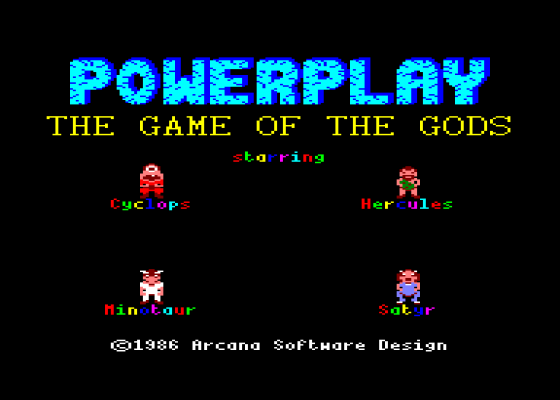
C&VG
 1st January 1987
1st January 1987
Categories: Review: Software
Publisher: Arcana
Machine: Amstrad CPC464/664
Published in Computer & Video Games #63
Powerplay
So often programs attempting to bridge the gap between two different types of game end up appealing to no-one.
Happily, this is not always the case as is proved by Arcana's Powerplay, a contribution to the ever growing catalogue of Trivia games.
Capitalising on this latest software boom, Arcana has taken the Trivia concept one stage further setting the whole proceedings on what looks like a multi-coloured chess board.

It seems that the gods themselves cannot decide who is the wisest and most powerful amongst their number lending further weight to the theory that man was indeed created in god's image.
To settle things once and for all Zeus has devised a battle of sheer wit and speed called Powerplay.
Each deity will have at his disposal four warriors to fight the battle for him, according to his commands.
There are four types of warrior. In ascending order of strength these are Hercules, Cyclops, Minotaur, and Satyr - the most evil and powerful warrior (well half man, half goat) of them all.
Once the main program is loaded you must choose the question file you want to use. This can be one of the four that come with the game consisting of 2,000 questions in all, or one that you have prepared yourself using Powerplay's excellent question compiler.
Having chosen the number of players, you must then decide on an overall difficulty level for the game. This sets the time limit each player is given to answer a question which ranges from 10 seconds (tough) down to 2.5 seconds which I found rather short as it takes you that long just to read the question.
In a game flexible in so many areas it is surprising that players are not given the option of setting a collectively agreed time limit for their contest.
Each player must then decide what method of control they want to use. Although more than one player can use the same joystick, when it comes to a challenge the second player has to use the keyboard, which can be fiddly. The keys Arcana has chosen are a little too close together.
Each god (that's you!) starts with three Hercules and one Cyclops, grouped together in one corner of the board. The winner is the god who eliminates all his opponent's warriors from the board. At the start of each go you must choose which warrior will be asked the next question.
Questions are on one of four subjects dictated by the colour of the square on which a warrior is standing. The subjects are: general knowledge, sports and leisure, science and technology, history and geography.
If a warrior correctly answers a question, points will be added to his wisdom score. And you can move him to any adjacent square not already occupied by one of your other pieces. The colour of the square on to which you move any warrior will determine the subject of the next question he is asked.
There are two exceptions to this rule. Firstly there are four magical squares on the courtyard, coloured cyan. When stepping on one of these a warrior will be randomly transported to another cyan square, or even back to the one he is already standing on.
Also, the subject of a challenge question is randomly chosen by the computer.
The more time taken to answer a question, the less points will be awarded. If no answer is given within the time limit play passes to the next player with no loss of points.
If, by correctly answering a question, a particular warrior's wisdom score exceeds 25 you will be asked whether you want to mutate that piece.
Press the fire button and the warrior will begin spinning and mutate into the next strongest warrior type. Of course, the mutation process uses up 25 wisdom points.
The advantage of mutation is that a player can withstand more challenge defeats before being eliminated.
The disadvantage is that the questions presented to stronger warriors become more difficult.
Trying to move on to a square occupied by an opposing piece will initiate a challenge, in which both warriors will be asked the same question.
The question will be on a random subject at the difficulty level of the stronger piece contending.
The player answering first wins the challenge providing the correct answer is given, but loses the challenge if the wrong answer is given. If neither player answers the question within the time limit the challenger loses the challenge.
The piece belonging to the player who loses the challenge is mutated down a level of strength, but no wisdom points are restored in the process!
Although the four quiz files that come with Powerplay should keep you occupied for many a long winters evening, you can create new ones using Powerplay's question compiler.
Each file you create has four topics and you must give each question a level which determines which type of warrior will be asked it.
Although time consuming, the compiler is a good addition to the package which will prolong its lifespan if you're prepared to invest the time in thinking up questions.
Powerplay is easily the most imaginative computer Trivia game to hit the streets and I wouldn't be surprised to see more quiz files appearing, either from Arcana themselves, or even from third party software houses or individuals who fancy themselves as budding Magnus Magnussons.


